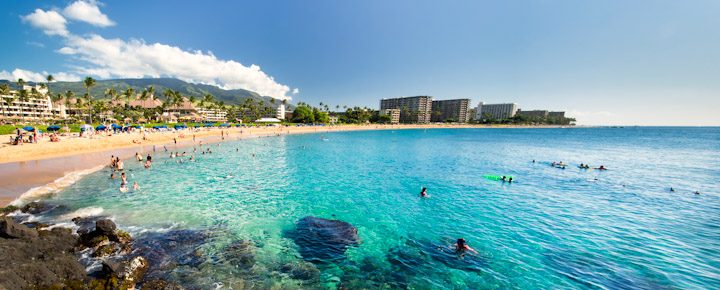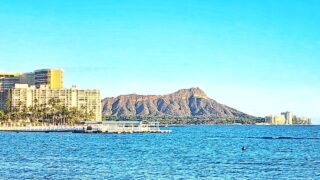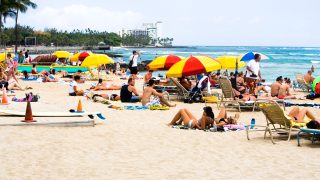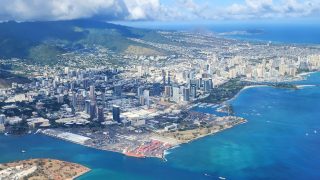In the state’s latest economic forecast below, Governor Josh Green’s administration pinpoints the downturn in tourism especially as it relates to the tragic Maui wildfires of last summer. However, upon closer examination, we’d suggest a far more complex tapestry influencing Hawaii visitors’ decisions exists.
“Pretty much everyone has lost patience with the Fishing for Housing Lahaina Strong crowd who, dissatisfied with $1,000 a night hotel rooms and 3 meals a day, camped on the beach to demand “dignified housing…After 6 months, even fire survivors told them to get a job and stop waiting for a house to fall from the sky. But this is who our mayor chose to pander to: people who want everything given to them. Forever.”
Regular commenter “katf” from Maui.
Visitors have increasingly been questioning Hawaii’s paradisaical allure for many reasons. Not only is that because of the Lahaina fire to at least some degree, but more so due to extreme costs together with the burgeoning anti-tourism sentiment fueled by prior beach protests, controversies surrounding vacation rentals, ever-increasing visitor controls, the severe lack of tourism infrastructure, and more. These issues have combined to form significant hurdles for tourism recovery on Maui and in Hawaii.
While the state government, under Governor Josh Green’s administration, points to natural disasters and broader U.S. economic conditions as primary culprits for the Hawaii tourism downturn, a deeper, more disquieting circumstances are at play.
Hawaii tourism will not recover until 2027, according to the state.
The state’s official narrative, which includes data about a recovery lasting two years longer than originally anticipated, may continue to underscore the fire as a causal element of the tourism slump. Still, for many potential tourists, the decision to stay away seems rooted in broader questions and concerns.
The situation in Hawaii is part of a larger discussion that continues to question the viability and sustainability of tourism. Local residents’ push-back against the overwhelming presence of visitors has magnified these concerns.
“Extreme costs, protests and the still evolving regulatory landscape around vacation rentals paint a picture of Hawaii as a destination at a crossroads, still striving to balance tourism’s economic benefits with community well-being and environmental preservation.”
Beat of Hawaii editors.
As Hawaii continues to navigate deep and challenging waters related to its sole economic driver, tourism, it becomes imperative to address not only the impacts of the fire but also the deeper, systemic issues that are deterring visitors and may do so to an ever-increasing degree in the future.
The Department of Business, Economic Development, and Tourism (DBEDT), quoted in Green’s press release, forecasts a sluggish economic recovery into 2027, with visitor numbers not expected to fully rebound until at least then. This situation, however, isn’t just about external economic pressures or the scars left by the disastrous fire. There’s a growing sentiment that Hawaii’s government has been slow to recognize—or has outright ignored—the burgeoning discontent among mainland visitors, who have come to feel increasingly unwelcome amid costs out of control, highly visible protests, and regulatory changes targeting Hawaii tourism.
This sentiment contrasts with Europe’s booming tourism sector, where countries are breaking visitor records. Both new and returning Hawaii visitors are diverting their itineraries toward these other exotic destinations that seem more welcoming and offer better value, underscoring critical missteps by Hawaii’s tourism strategists.
On the islands, this discontent stems from multiple sources. The expansion of vacation rental regulations, frequent beach protests, and public outcries against over-tourism have contributed to a portrait of a destination at a crossroads. Despite these significant challenges, the state’s narrative focuses narrowly on high-profile disasters like the Maui wildfires, neglecting less visible yet profound shifts in visitor perceptions and local sentiments.
The economic data paints a telling picture: a drop in visitor arrivals and expenditures, a decrease in state general excise tax revenue, and even a dip in the labor force across all counties, with Maui hit the hardest. While some sectors like construction show growth, the core of Hawaii’s economy—tourism—is wavering under the weight of acknowledged and unacknowledged pressures.
As Hawaii grapples with its challenges, the way forward must include a candid reassessment of how the state perceives and caters to its visitors. A more balanced approach that recognizes tourism’s contributions to the local economy while respecting and preserving community well-being and environmental sanctity is more essential now than ever before.
We welcome your thoughts in the comments below.
Governor-Josh-Green-M.D.-_-NEWS-RELEASE_-DBEDT-CONTINUES-TO-PROJECT-SLUGGISH-ECONOMIC-GROWTH-IN-2024Get Breaking Hawaii Travel News







We have been there twice, we really liked it. We stayed at a friend’s condo and then at a friend’s time share. Both times was great. We spent a good amount of money. But what I hear is unwelcoming and hotel prices I can’t afford. So we are searching the web for places that welcomes visitors, and their is still a lot of out there.
My husband and myself and my sister have scheduled a trip to Hawaii for 2 weeks in February of 2025 but after reading this we may have to change our plans to maybe somebody somewhere else what I read is not attracted to you most residents do not want us there there’s nowhere for tourists to sit on the beach and be comfortable the skyrocketing prices I think I’d like to put my money in another place your friends always Canadians we will be looking elsewhere
Anyone who has lived here understands the ineptitude of the State & Local government.
The one most publicized was when they ignited the warning for an incoming nuclear attack that was an error and Noone knew the password to the Governor’s Twitter account to make a correction. This typifies our state. It’s embarrassing!
The horrible response to the fires and is simply an example of a larger problem. We don’t have a housing problem or a tourism problem. We Have A Leadership Crisis!!!
Our first and only visit to Hawaii was in summer 2008. We stayed at a condo on the Big Island that was owned by the real estate firm my brother-in-law was with. He earned a 10-day stay and we were their guests on the trip. By and large the experience was smooth and pleasant. On the fringe however, was an underlying current that made us feel unwelcome. Several times I heard the word “haole” whispered behind my back along with a number of blatantly rude encounters. The kicker, by a longshot, was when we were boarding the plane to fly back home. As we were walking out on the tarmac to the airplane stairs, I gave a casual wave and a smile to the three baggage handlers sitting on their vehicle watching us. As I did that, I got in return, organically and simultaneously, three middle fingers back at me with the most authentically smug and resentful grimaces you will ever see. Regardless of how the stay was, that is the lasting impression I will have of your state.
Tourist Salute.
lol. That’s funny. Hope they haven’t missed our tourist dollars over the years.
I live in the SF Bay Area and have lost all desire to visit Hawaii. It used to be a “easy” destination in the sense that it was 5 hours away with no language or currency changes.
But now, Hawaiians blame their entire existence on visitors. Now, we go to Europe 2 times per year and love it so much more…even though it is an 11 hour flight. We leave for Greece June 17.
We’ve never paid $300/night (except London), Never Ever paid a $50/night resort fee On Top of a $220 “destination fee.” I mean, what the hell????
People who rip me off do not get my respect. Hawaiians do not get my respect.
The concept of Aloha is a joke.
I wonder about the actual attitude of local folks when it comes to tourists. Is it actual or magnified in our minds by stories we read on sites like this?
I’ve been coming to Hawaii for Decades and I can only vaguely recall one event where I thought I might have to exchange blows – once.
I lice in Southern California and read about all the crime. But, firsthand, I’ve yet to experience it.
I used to share the same perspective and still do to some extent.
What solidified the negative attitude towards visitors in my mind are when places like Ke’e Beach and other beaches started charging exorbitant fees to visit those locations, these laws were passed by local polititions and to me reflect the attitude of the locals. Let’s also not forget Bissen/Green/Pelletier on the news in the aftermath of the Lahaina fire critizing visitors and mentioning how visitors treat Hawaii like Disney (Bissen).
It is examples like that and other actions they have taken that indicates there is an underlying resentment towards visitors.
A strong majority who live here on Maui are welcoming and dependent upon the tourism dollars. It’s the extremely vocal (small minority) have grabbed the bullhorn and have changed the narrative from actual reality. They want ro kill the Golden Goose along with every local business owner.
Completely agree. The hype is not the reality. The very small vocal group is creating the controversy. I find the Maui locals to be friendly and welcoming. As do friends who visits Maui on the West side.
Thanks for the local input on this, what is the deal with the politicians listening to the small minority that is against tourism?
You’re familiar with “politics makes strange bedfellows?” Some politicians, like the mayor, do the hotel owners’ bidding. So they introduce a bill to wipe out the hotel’s competition. There’s also this group that hates tourists. Ah! Sell the hotel Christmas bill as a “help-our-local -people” bill. All we have to do is convince them that they can live in multi-million dollar ocean front property for $1,000 a month rent if they support the bill.
Other than travel bans during Covid, we have visited Maui annually for 8 years, usually for 30 days per trip. We have the funds to go back but until we feel welcome again, we will spend our traveling funds elsewhere.
The failure of basic leadership and competence among Hawaii’s political class is just astounding. This political class lives within their own bubble of visions of what amazing jobs they do yet outside the bubble basic infrastructure deteriorates, tax money squandered, senseless regulations increase, available services, jobs and housing have been in a downward spiral for decades. Yet inside the comfort of the land of make believe in their bubble politicians blindly and myopically carry on. Maui is a perfect example. They are good at fashioning economic depression but so much at prosperity.
Tyler C,
You are so right on, and absolutely correct in your analysis. The problem IMHO is that there are too many residents (voters) in Hawaii who have not felt enough personal freedom restrictions and economic hardship to do anything about it, such as voting out all of these incompetent politicians in the Green/Bissen clown car.
Nothing will happen until these politicians are completely repudiated by the citizens at the ballot box.
Aloha to all.
The problem with One Party Rule, Green/Bissen, were preceded by Ige, who in 2019 had the Nuclear Attack Warning go off in Waikiki, Senator Hirono (remember her trifecta of “we have too many Old, White, Males”) immediately blamed the USN, there was no where to go, there were Heart Attacks, Panic, at days end, it was a City/County Employee who did not follow protocols! Duke Aione (R) was Lt. Governor under Lisa Lingle (R) former two Term Mayor of Maui and two Term Governor of Hawaii through 2010, my understanding he is running in 2024.
Hirono’s words ring true in my ears as, I’m sure, it does with many others. That isn’t the only example of racist, isolationist rhetoric that she’s spewed over the years. One cannot help but to associate that attitude with those that elected her.
Unfortunately green has 2 more years. He will have plenty of time to continue ruining our state. Him and Blangiardi have created racism between local as and the so called white but they continue to take bribes from the ones that have it .
Nailed it!
I am pretty sure that the majority of STVRs are run by women, and that the “best hosts” are women in their 60s.
For me, since 2013, through STVRing, I’ve finally found a way to earn enough of a living that I am not housebound. Therefore, removing STVRs is a feminist issue.
If lawmakers are the last to recognize the untold millions lost in tax revenue by shutting down STVRs, that shows they are not in it for Public Service, but instead, for Personal Gain.
There is an easy answer to “problematic STVRs.”
Shut down hosts who allow problems to occur, and allow those of us hosts who are not only earning a living, but who are providing guests a choice in lodging to carry on.
I meet your demographic. 🙂
I and my wife traveled to Oahu and Kauai and had a fantastic time The only thing that we found disconcerting was that the hotels at both locations attempted to upsell us even though we already paid for upgraded rooms and found that the rooms that they did assign us were less than adequate on rooms that we’d already paid for upgrades when booking also the ridiculous fees charged for parking at the hotel after paying exorbitant prices for the hotel Will we ever go back probably but we’ll look for a condo you simply don’t spend enough time in the hotel to pay for ocean views that you have to hang off the balcony to see
The problem is, you’re going to have a very difficult time finding a condo if the new anti short term vacation rental laws pass. You might consider weighing in on the law as a guest of Hawai’i and letting lawmakers there know your feelings. Then again, I think those lawmakers are catering to the Hotel Lobby and to billionaire tourists, so they might not care.
Visitor here who is skeptical of returning to your beautiful island because of all the anti tourism sentiment. I don’t want to spend my hard earned money where I don’t feel welcome. Great article and I hope things start to change.
The sentiment is a narrative… not a reality. That narrative has been spewed by a small minority of locals who have used the fire to amplify their voice.
Meanwhile all the local business owners suffer the consequences.
Just how many commenters does it take for it to go from “narrative” to “reality”? Seriously, you people have a big, big problem.
Considering there are millions of visitors and thousands of businesses… it would take a lot more than what you are seeing here. I live here and I’m a business owner. I see reality…. and it doesn’t line up with this narrative.
Hawaii’s politicians lately have bowed to the loud voices of fringe groups like Lahaina Strong and to their greatest financial backers – the hotel industry. While everyone shares grave concerns about affordable housing, anyone with any economic savvy (including the politicians) knows that the proposed phaseout of 7,000 vacation rentals on Maui will not solve or even significantly improve the housing crisis. Even if the phaseout cut the resale values of those 7,000 units in half, they will remain unaffordable and impractical for anyone struggling with the high cost of housing on Maui. The loud anti tourist locals will probably never go away, but in my experience they don’t exist in real life interactions I have with locals. I live on Maui for about half of the year and own undamaged property within the Lahaina burn zone. I have been thanked by nearly every business owner/operator/server I’ve interacted with on Maui, who understand that showing aloha to visitors is vital to Maui.
My wife and I got married o. Maui in 2000. We have vacationed on all four of the main Hawaiian islands since, about 15 times total trips. Our last trip was in 2022. We are not coming back. The Aloha spirit is dead, the anti-tourist vibe is palatable and, the government just wants to tax visitors more each year. It is already and expensive place to vacation. We have taken our vacation dollars to the Caribbean. Friendly welcoming people, amazing food and fair prices. Beautiful beaches, warm blue waters and great weather.
Aloha Hawaii
Granted there are lot of places in the Caribbean but when Hawaii is losing out to the BVIs or St. Barts on value that is quite an anti-accomplishment.